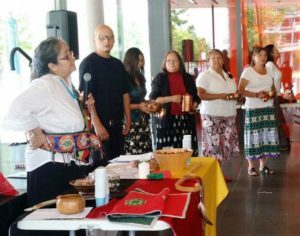New report on First Nations water crisis launched by Human Rights Watch

By Barb Nahwegahbow
The launch of the report by Human Rights Watch on the First Nations water crisis began with ceremony. Cree Elder Pauline Shirt conducted a water ceremony at George Brown College Waterfront Campus on June 7 where the news conference to launch the report was held.
“It is the woman’s responsibility to care for the water,” Shirt said. Her four women helpers took up the copper vessels to offer a blessing for the water, and then offered the water to everyone present.
The 92-page report by Human Rights Watch titled, Make It Safe: Canada’s Obligation to End the First Nations Water Crisis, is based on research conducted between July 2015 and April 2016. Human Rights Watch is an international organization that advances the cause of human rights worldwide.
The report says that the Canadian government has violated a range of human rights obligations towards First Nations persons and communities by failing to remedy the severe water crisis. Ninety-nine households in 5 participating communities were surveyed. The participating First Nations were: Batchewana, Grassy Narrows, Shoal Lake 40, Neskantaga and Six Nations of the Grand River. Additional interviews were conducted with First Nations leadership, academics, environment and water experts, and First Nations water operators in these communities and other communities.
Linda Redsky of Shoal Lake #40 is a grandmother and health worker who assisted Human Rights Watch to do their documentation. “The problem is not water,” she said. “The problem is inequality and institutionalized discrimination that ensures that settler communities get essential services while Indigenous communities do not.”
Redsky said her community got running water 22 years ago in 1994, but they have been under a boil water advisory for the last 19 years. “My granddaughter’s entire lives have been lived under a boil water advisory,” she said, “I should not have to take them to Winnipeg so they can have a clean bath.”
“Equality for First Nations children needs to be done in a leap, not a shuffle,” said Redsky.
Researcher Amanda Klasing was the senior researcher for the project. She said that unlike Canadian communities off-reserve, First Nations communities lack binding, safe water protections. “When systems are built, they’re not built to those standards that would exist in the province,” said Klasing.
Past funding has been inconsistent and insufficient to meet the basic water and sanitation needs of First Nations communities, Klasing said, “and there is little tracking and oversight to ensure that government commitments lead to lower risk and better water across First Nations communities.”
She was most struck by the caregivers she interviewed. They shoulder an extra burden to ensure that their children, the elders, the disabled and persons recovering from illness avoid exposure to unsafe water. “This burden and the daily indignity…causes stress and worry,” said Klasing.
The water crisis also impacts the cultural rights of First Nations people, the report found. Ceremonies, and customary fishing and hunting practices are impacted when the water is contaminated.
Fawn Wapioke of Iskatewizaagegan 39 First Nation was part of the delegation of six Indigenous women who went to the United Nations in Geneva in February 2016. “We spoke not only about the lack of access to drinking water and the violations against Indigenous women,” she said, “but also about the violations against the water that we’ve been seeing.”
Women have a sacred responsibility to care for the water, said Wapioke. “Indigenous people continue to be criminalized for our efforts at protecting our lands and waters,” she said. “It’s time to restore those relationships, to restore that balance because the relationship that we have with the water and the wellness of the water is intimately connected with the wellness of our people.”
The report contains a number of recommendations including the establishment of a First Nations-led Water Commission to oversee and provide a level of oversight to ensure that the government’s commitments are being met.
Make It Safe is available at: www.hrw.org/node/290522/


